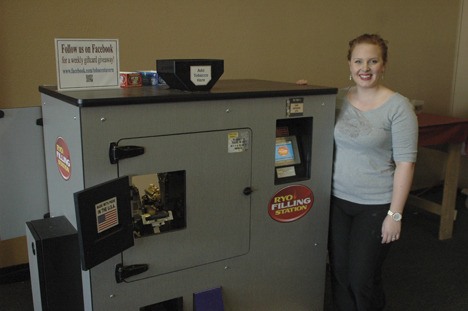A common complaint of smokers is the seemingly rocketing price of a pack of smokes. The habit is expensive, made more so by mounting taxes on tobacco products.
In response to consistent price increases on product, the market’s responded with a relatively new business model for tobacco shops.
You might think of it as the Build-A-Bear model: stores that provide the materials and means to create a carton of smokes, but do not sell manufactured cigarettes. The result is a cost savings of roughly half what a consumer might normally pay for a pack or carton. At Tobacco Tavern of Bonney Lake, the price works out to $34.95 per carton and $4 per pack, which includes the price of tobacco, paper tubes and renting a tube-packing machine.
“There’s about 65 stores like us in the state right now,” said Sevrianna Bertrand, owner of Tobacco Tavern. “We’re each independently owned; the only common denominator among all of us is the RYO tobacco filling station.”
The RYO Filling Station is presently the only game in town for single-carton tobacco-packing machines, due to an array of patents held on its components.Thus every DIY tobacco shop has one to rent.
“We’re pretty strict about calling our product smokes, as opposed to cigarettes,” Bertrand said. “The word cigarettes gives you a pretty pre-conceived idea of what we sell as a manufactured product, and that’s something we try and avoid. We don’t manufacture anything, our customers make their smokes for themselves, same as if they did it at home.”
The distinction is important to maintain low prices for customers. If you buy a pack of cigarettes, you don’t just pay the sales tax at the register: your base price reflects taxes levied on every stop in the production process, from farm to manufacturer to wholesaler to retailer. DIY shops don’t have a manufacturer in their supply chain; so while they still pay a tax on their tobacco, they do not have the tax burden of a manufacturer built into their price.
Bertrand opened Tobacco Tavern on Dec. 14, after her father established successful DIY shops in Fife and University Place. Based on a process of taste testing, the store offers a matrix of tobacco and filter combinations to help customers find the closest equivalent to their favorite manufactured brand.
All tobacco is bought in bulk from Kentucky Select, and stored in airtight plastic containers. Humidity is monitored regularly with a handheld device. Too moist, and Bertrand leaves the lid off the container for a period of time; too dry and she introduces steam to the container. She encourages new customers to store their smokes in a plastic bag in the freezer, and the store offers a return-and-replacement policy if a customer isn’t happy with the quality of a carton.
The drawback of the DIY tobacco shop model is the required time. The RYO filling station takes eight minutes to finish a carton of 200 smokes. For one customer, it’s a few minutes longer than a typical drop-in for a pack of cigarettes. For seven customers, it means a wait that can last up to an hour.
Because of the necessary wait, the shop has a lobby with a television, jigsaw puzzles and magazines to create a comfortable environment.
“We’ve gotten a ton of return customers and loyal customers,” Bertrand said. “We’re picking up now that people know where we are.”
Tobacco Tavern is located at 20839 state Route 410 E. in Bonney Lake.



